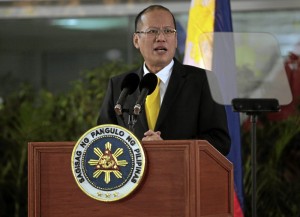Aquino sees 6% growth for the year
The Philippines, riding on a 5.9-percent economic growth in the second quarter and a phenomenal surge in global competitiveness, is poised to post a 6 percent economic growth for the year, President Benigno Aquino said Wednesday.
Mr. Aquino raved over the country’s “20-place jump” to 65th place out of 144 economies in the World Economic Forum’s Global Competitiveness Report for 2012 to 2013, and 5.9 percent GDP growth in the second quarter, crediting Filipinos for acting as “catalysts for the sea change.”
These were the “best indications of our collective success,” Mr. Aquino told business leaders attending the IBM Think Forum at the Makati Shangri-la.
“The Philippines is truly on the right path. Everyone—from our countrymen and tourists, to leaders of industry both in the country and beyond its shores, to organizations and other governments—shares our optimism,” Mr. Aquino said in his speech.
He noted that the Philippines had jumped another 10 places to rank 65th out of 144 economies in global competitiveness when in 2010 it only ranked 85th.
“That is in total—for those less challenged in math—a 20-place jump in ranking since we took office. Allow me to emphasize that this is the first time we have broken into the top 50 percent of countries since 1994, the year the Philippines was first included in the report,” he said.
The economy expanded 5.9 percent in the second quarter, one of the highest recorded among countries in the region.
On target
“If all goes as planned, we’ll be on target in achieving between 5 to 6 percent GDP (gross domestic product) growth for 2012,” Mr. Aquino declared in a spirited speech which drew distinctions between a “half-full glass” and “half-empty glass” outlook on the economy.
“These achievements, together with the 44 record highs of the Philippine Stock Exchange index, and the fact that the Philippines is now only one level below investment grade, according to two of the three major ratings agencies, show that we are well on our way to filling up the half-full glass,” he added.
All these positive economic gains and the international community’s positive outlook on the country’s performance were a complete departure from 2010, when he assumed the presidency, Mr. Aquino said.
“Two years ago, who would have wanted to invest in the Philippines? Capricious regulation, opaque processes and widespread corruption made the playing field anything but level,” he said.
He said that in the first few months of his presidency, the administration had to grapple with a great concern: “how to balance the need for basic housekeeping and repairing the eroded base of our institutions, while competing in the global arena.”
“There were times in those early days when the glass truly appeared to be half-empty, when the amount of problems we unearthed every day threatened to overwhelm us,” he said.
But the administration stood its ground and carried out reforms along good governance principles, firmly believing that “good housekeeping would result in a revitalized and progressive society,” Mr. Aquino said.
“We knew that if we kept treading along the straight path, in the direction that the Filipino people set for us, we would achieve our shared aspirations: institutions free from corruption and the politics of self-interest, a society that values equal opportunity and inclusive growth, and most importantly an empowered citizenry,” he said.
He paid tribute to the businessmen who saw the country’s potential and put in investments “despite a history of politics of convenience.”
He gave all the credit for the economic breakthrough to “our bosses, the Filipino people” who continued to be his “compass”.

